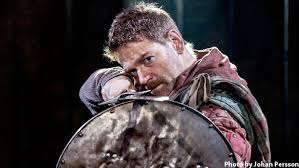 |
Kenneth Branagh's Macbeth will be broadcast
live from Manchester on November 6 at
Fort Worth's Modern Art Museum |
Since the early days of film, Shakespeare's works have been popular source material. From silent films made from snippets of
Romeo and Juliet to ultra-modern productions such as Ralph Fiennes's
Coriolanus, there exists abundant proof that Shakespeare is, as Orson Welles quipped, "alive, well, and living in Los Angeles." However, the new vogue in Shakespeare films is actually returning the Bard's works to what purists such as myself consider their proper home: the stage. Filmed versions of stage productions (broadcast live or screened months after their original runs) are becoming increasingly popular. A National Theater production of
Othello, starring Adrian Lester and Rory Kinnear was broadcast live in the US while the actors themselves played to an audience in Britain. Kenneth Brannagh's acclaimed production of
Macbeth is also hitting screens across the US this fall. But that is not all, the Royal Shakespeare Company plans to mount a production of
Richard II starring David Tenant in the title rol
Hamlet, the RSC's new offering should be a triumph. According to the latest buzz,
Thor star Tom Hiddleston (whose glorious rendition of Hal/Henry V in the "Hollow Crown" series may just have been the greatest rendition of the character since Kenneth Branagh's acclaimed film) is slated to play the title role in an upcoming production of
Coriolanus, also to be streamed live next year.
e. This production, too, will be filmed and subsequently screened in cinemas around the world. If this production is to be anything like Tenant's wildly successful rendition of
There is nothing new about the idea of filming a play for mass offerings in theaters. In the 1960's, Richard Burton's performance in a "rehearsal" of
Hamlet and Laurence Olivier's
Othello both found their way to the silver screen. While the screening of films made of these stage productions certainly succeeded in preserving the actors' performances and making the productions available to a wider audience, they were not commercially or critically successful. While both productions succeeded in preserving the performances for future generations, making the productions available to a wider audience, and lowering the prices of tickets for those viewing the production as a film, the combination of theatrical acting and poor cinematography made the films unappealing. We may rightly wonder what it is that has caused the resurgence of this failed technique which failed so utterly before.
 |
David Tenant prepares for his role as Richard II
Photo: IMDB |
Technology plays a large role in answering this question. The creation of the internet and the availability of video streaming now makes it possible for audiences to watch films of stage productions as they take place. Both the National Theater's
Othello and Branagh's
Macbeth were planned to be filmed and broadcast live. This greatly enhances the "authenticity" of the stage production. Techniques for filming stage performances, musicals, and concerts have also improved in the last half-century since Olivier and Burton's productions. New balances between capturing the full action on stage and capturing close-ups of the actors have been achieved to provide audiences with a more engaging and cinematic visual experience. The final explanation I have to offer is probably the most tenuous, but, I feel, equally valid. Actors drift far more commonly and comfortably between stage and screen than ever before. Kevin Spacey, Helen Mirren, Al Pacino, David Tenant, Meryl Streep, and Kevin Kline have all moved from film and television to stage and back again in their careers. Younger actors too are following suit with stars like Daniel Radcliffe, and others appearing on stage and screen. Actors today are simply more versatile. No longer are stage actors turning up their noses at movies in favor of "legitimate theater" and movie actors will no longer dismiss serious theater as snobby (recall Gene Kelly and Debbie Reynolds' first conversation in
Singing in the Rain and you will realize how serious this rift once was). Because actors are now valuing stage and screen performance, they are more able to balance between the two styles of stage and screen acting, delivering fuller performances that fit both mediums equally well.
Regardless of the reason for its resurgence, there can be no doubt that filming stage productions of Shakespeare is now en vogue. According to a
Time magazine article, Benedict Cumerbatch is set to appear in a production of
Hamlet next year. While nothing has been said yet, we can only assume the production is likely to be coming to a screen near you...

No comments:
Post a Comment